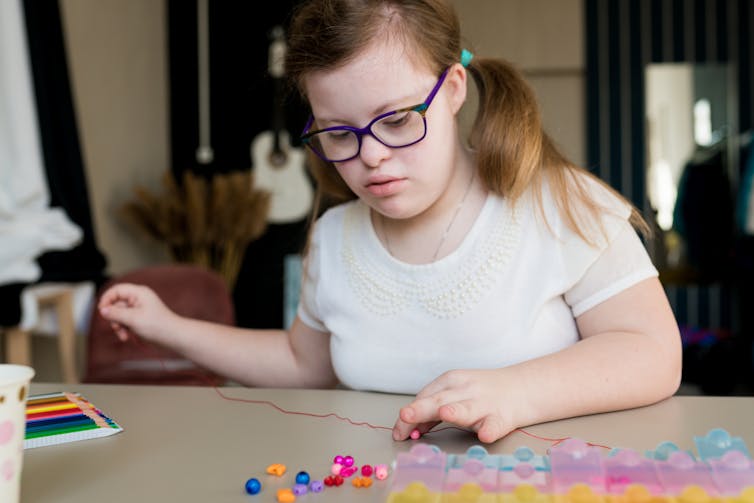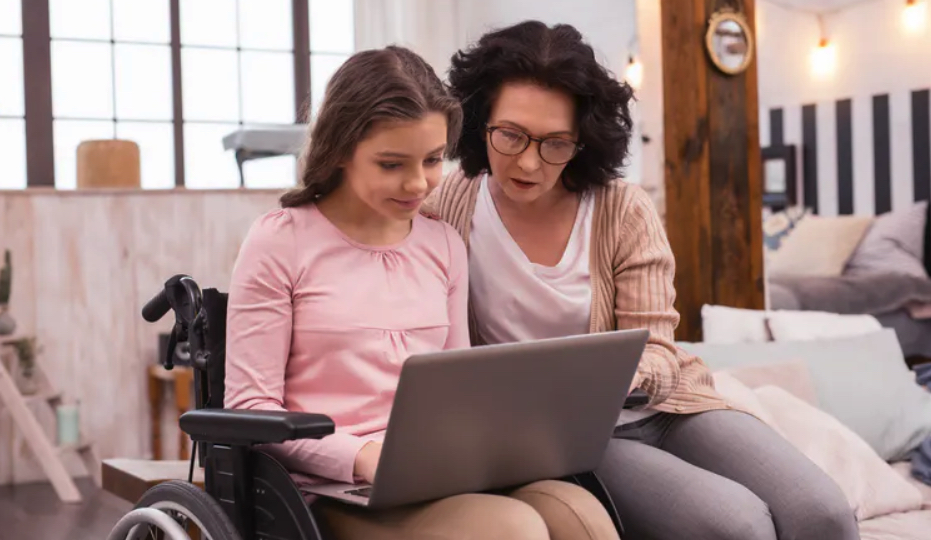This week the Disability Royal Commission highlighted several failings in ensuring people with disability – a priority group in the rollout – could access vaccinations.
Children and adolescents don’t feature strongly in this report as they only became eligible for vaccination last month.
Yet 62% of parents responding to a recent survey by Children and Young People with Disability Australia (CYDA) report having trouble securing a vaccination for their child or children with disability.
While numbers of children contracting severe illness because of COVID have been low to date, the Delta variant has changed this situation. Countries such as the United States are seeing spikes in hospitalisations among children and adolescents.
As Australia starts to “live with” COVID and restrictions ease, we will see substantial increases in severe infection in children and young people with disability – unless vaccination rates rise significantly among this group.
Read more: Opening up when 80% of eligible adults are vaccinated won’t be ‘safe’ for all Australians
Why are children with disability at greater risk?
Australians with disability are at heightened risk during the COVID pandemic because many have other health conditions, such as respiratory problems, heart disease, and diabetes. This makes them more likely to get sicker or die if they become infected. This is the case for children with disability too.
People with disability are also more likely to be poor, unemployed and socially isolated, making them more likely to experience poor health outcomes.
In other countries we’ve seen people with disability die from COVID-19 at higher rates than their non-disabled peers. In England, nearly six out of every ten people who died with COVID in 2020 were disabled, and this risk increases with level of disability.
Severe COVID is uncommon in children and adolescents and rarely causes death, although children with pre-existing conditions are at greater risk of severe disease.
There is debate over whether the Delta variant of COVID causes more severe disease than previous variants in children. However, it does spread faster so the number of children who will develop severe disease will be increased.
Also, because older groups have been prioritised in vaccination campaigns, we will see infections grow in children as a proportion of overall infections.
We have seen this in the United States. Schools recommenced recently and the country reported its highest weekly rate of new cases in children and young people since the pandemic began.
US children’s hospitals are reported to be straining under pressure, with a fivefold increase in COVID hospitalisations. In any rise in cases, those with disability disproportionately bear the burden of severe disease.
Children with disability can’t book vaccinations
Children and Young People with Disability Australia (CYDA) wanted to understand whether children and young people and their families were experiencing challenges accessing vaccinations and if so, what the nature of those were.
Its online survey was open for one week and received 150 responses, which our research team then analysed. Some responses were from young people and most were from parents/caregivers of children and young people with disability.
The survey finds 62% of respondents were parents or carers who report having trouble in securing a vaccination for their child or children, some of whom had also experienced challenges getting vaccinated themselves.

Almost two-thirds of parents surveyed struggled to get a vaccination appointment for their child. Shutterstock
In total, 72% of survey respondents were either parents or young people who’d had challenges with vaccination. This includes difficulties with booking systems, not being recognised as part of the priority rollout, and not being able to book with GPs.
Systems are not designed with children and young people with disability in mind. Parents and caregivers struggled to get vaccination appointments and to prove their or their child’s eligibility.
Read more: Vaccinating the highest-risk groups first was the plan. But people with disability are being left behind
The system is not set up to book for dependants, so if children do not have their own phone number and email address, parents cannot easily book appointments.
When phoning the call centre, things did not always get easier as one parent explains:
The person at call centre only wanted to talk to my son who is 16 and non-verbal. Refused to talk to me.
Parents report having to do much work via a number of different channels to secure an appointment for their child or young person, for example:
I ended up spending 7 hours in total calling different GP practices and sitting on hold and eventually secured my child an appointment. NSW Health hubs took a month to catch up with priority eligibility for 12-15-year-olds with disabilities.
I know people who have not been able to secure an appointment for their child with a disability. Many GP practices did not know that this group were eligible or would not accept anyone who wasn’t an existing patient. This is inherently discriminatory.
Inaccessible vaccination experiences
Once appointments were booked, several respondents reported vaccination hubs and GP practices were not accessible or able to cater to the needs of their child or young person. As one parent explained:
My son is Downs Syndrome and severe Intellectual Disability and going to a Vaccination Hub is traumatic. He has a phobia of needles and to take blood he has to go under general anaesthetic at […] Hospital.
Some young people with disability have experienced high degrees of medical trauma in the past and so find accessing regular vaccination processes very difficult. One parent told us that:
I know of many incidences where parents have had to do restrictive type practices to ensure that their child with a disability was able to remain still during their vaccination, lots of trauma and anxiety, not to mention the potential for future stress/trauma.
In many places a lack of access to GPs or specialist services mean parents have to make difficult decisions about whether to put their child through a traumatic process or else risk them being unvaccinated.
Read more: 'I'm scared': parents of children with disability struggle to get the basics during coronavirus
Some good practice but not widespread enough
However, there are some areas where things have worked.
Victoria has a disability liaison officer service that seeks to link up people with disability with appropriate vaccination experiences. One parent explained:
Initially had this challenge until I was made aware of the Vic Disability Liaison support for COVID vaccination. They were awesome and my daughter was supported to have her first dose yesterday. Without them I’d still be waiting, without support and anxious. I understand this is only available in Victoria and should be available everywhere.
And some families have GPs who went the extra mile to vaccinate in a safe and appropriate way.

Some health providers have made the effort to provide appropriate services for children with disability. Shutterstock
But these good examples are not widespread and the communication around specialist services is not as strong as it might be.
As the country moves towards living with COVID and progressively lifting public health restrictions, it’s imperative we vaccinate as many children and young people with disability as possible. Otherwise we’re likely to see significant numbers of infections and severe illness in this group.
Identifying individuals and families who are eligible and providing appropriate specialist support so they can be vaccinated is a priority.
Helen Dickinson, Professor, Public Service Research, UNSW; Catherine Smith, Lecturer, The University of Melbourne, and Sophie Yates, Postdoctoral Fellow, UNSW
This article is republished from The Conversation under a Creative Commons license. Read the original article.



